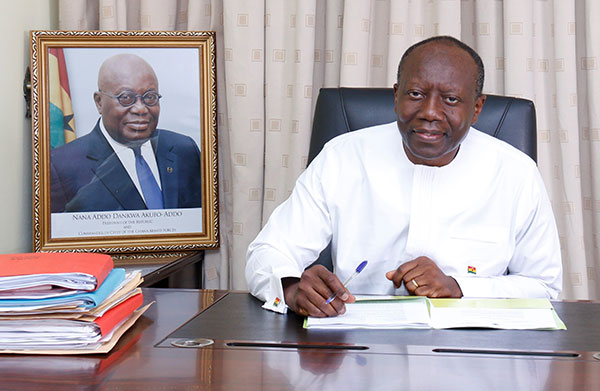The International Monetary Fund (IMF) has urged government to focus the Ghana Coronavirus Alleviation and Revitalisation of Enterprises Support (Ghana CARES) programme on few sectors that can make immediate impact on recovering the economy, rather than taking a multiple sector approach which will be difficult to finance.
The Ghana CARES programme seeks to invest in multiple sectors across agribusiness including food import substitution, manufacturing (textiles, pharmaceuticals, automotive), heavy industry and petrochemicals, as well as creating a thriving technology ecosystem and financial services hub in the country.
The agenda also encompasses roads, rail, water, electrification, hospitals and housing, increasing FDI, venture capital financing, and strategic partnerships with donors and other partners.
But the IMF has advised that, given the funding structure of the GH¢100 billion programme, where 70 percent is expected to come from the private sector, with government contributing the rest, it will be better for the programme to prioritise some sectors over others, especially, as fiscal space constraints remain a huge challenge.
“The CARES program has the potential to accelerate growth but needs to be prioritized given limited fiscal resources. In a first stage, the government could focus on a few export industries in agro-processing or manufacturing that could achieve economies of scale and create jobs, giving preference to solutions that do not add to public debt.
This structural transformation can be complemented by diversification in tourism, finance and IT, and by the digital transition, which has potential to reduce corruption, boost tax revenues, and improve service delivery.
Given limited fiscal space, implementation of the program will likely need to focus on a few, export-oriented industries in a first stage, following the example of other countries that achieved growth accelerations,” the IMF Article IV report has advised.
The report further stated that, if properly implemented, the Ghana CARES programme will deliver on its objective of bringing about economic transformation, especially as government is aggressive with the digitaisation agenda which could accelerate growth.
“The authorities are of the strong view that the Ghana CARES program will deliver a stronger, more resilient and transformed economy. Guided by the “Ghana Beyond Aid” agenda, the CARES program is anchored on an ambitious domestic revenue mobilization agenda, consolidating private-sector investment into productive sectors of the economy and leveraging on calls for a new ecosystem that enables cheaper access to global capital for emerging and developing countries like Ghana.
The authorities remain upbeat about the fact that their aggressive digitalization agenda can propel the economy by formalizing the economy to a higher degree, help reduce corruption, and improve government service delivery,” states the report.
About Ghana CARES
The Ghana CARES programme will be carried out in two phases. The first is the stabilization phase, which aims at supporting enterprises recover. These include paying outstanding obligations to contractors and suppliers; injecting liquidity into the system and ease the cash flow difficulties of businesses; developing another programme to support large business hard hit by the pandemic; and also sourcing from the pharmaceuticals and textile & garment sectors and expand procurement from local producers for its goods and services.
Other interventions in the programme are establishing a guarantee scheme of up to GH¢2 billion to enable business to borrow from banks at more affordable rates; increasing funding to the CAP-BuSS Programme being run by National Board for Small Scale Industries (NBSSI); and providing seed-fund for a retraining programme to help workers who are laid off because of covid-19 to develop new skills.
The second, which is the medium-term revitalisation phase, will also include initiatives such as supporting commercial farming by complementing the Planting for Food and Jobs and the Rearing for Food and Jobs programmes; providing targeted support to enable the private sector accelerate progress in building Ghana’s light manufacturing, technology, and digital economy sectors.
This phase will also make Ghana a regional financial hub by establishing an International Financial Services Centre (IFSC), as well as a regional manufacturing and logistics hub for the West Africa region; review of flagship programmes such as the 1D1F, free SHS and water and sanitation; enhance the business environment of the private sector through digitization, skills training, improvements in business regulations and their implementation, energy sector reform and expanding access to finance.










